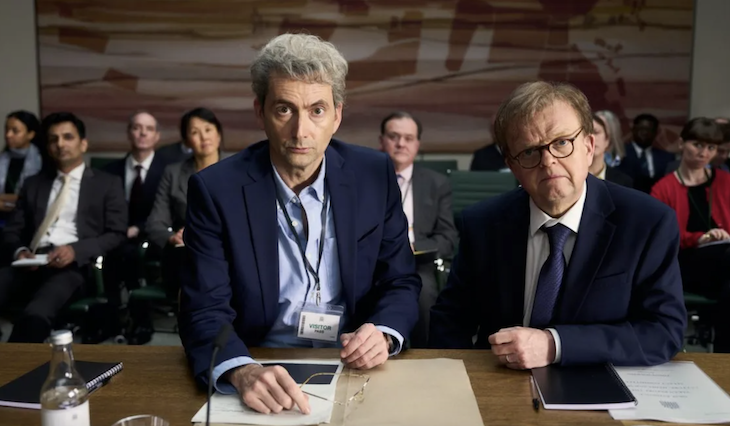When ITV executives commissioned The Hack, the new drama series dealing with the News International phone hacking scandal, they surely hoped they were getting another Mr Bates vs. The Post Office. Not only did it star that show’s Toby Jones as – bizarrely – Guardian editor Alan Rusbridger, complete with ludicrous wig, but it was another left-leaning account of how journalistic ethics, as personified by David Tennant’s Guardian investigative writer Nick Davies, could triumph over the forces of Machiavellian wickedness. If we didn’t get the message already that Rupert Murdoch was a villainous figure, he is played in the show by none other than a prosthetics-encased Steve Pemberton, in a role that could easily have strayed out of The League of Gentlemen or Inside No 9. It sounded like it would be a sure fire hit.
Not only has the show been panned, but it has been panned by the Guardian itself
However, in one of the year’s funniest twists, not only has the show been panned, but it has been panned by the Guardian itself. Despite The Hack essentially being a love letter to the newspaper, its television critic Lucy Mangan gave it a two-star rating and criticised it for being ‘very boring’. Mangan’s verdict is that ‘the script is deeply lacklustre. It is repetitive…it simply has bad lines and bad ideas…[and] it has a suffocating reverence for its subject that frequently borders on risible.’
The man responsible for the deeply lacklustre script of The Hack is Britain’s busiest and most prolific screenwriter, Jack Thorne. He was feted only a few months ago for co-writing the drama du jour in the form of Netflix’s Adolescence, but seems to be having a competition with the similarly benighted Steven Knight to see who can produce more work, and often flawed work at that.
In the past few years alone, Thorne has given us plays (the Burton-Gielgud drama The Motive and the Cue), miniseries (His Dark Materials, Toxic Town, The Hack), films (Enola Holmes one and two, Joy) and even shorts, in the form of An Almost Christmas Story. Thorne is less a productive writer than he is a Stakhanovite one-man creative force, endlessly churning out yet more scripts. (Next up: Lord of the Flies and co-writing Sam Mendes’ Beatles films.)
The problem is that, as with Knight, the preponderance of the writing does not mean that it’s always up to much. Thorne leans into exposition in his screenplays and dramas that you would have hoped any decent director would have taken out. I remember a conversation between the John Gielgud and Elizabeth Taylor characters in The Motive and the Cue in which Taylor obligingly fills in Richard Burton’s backstory for the director, which might as well have been written on the page as: ‘You know this…you also know this.’ As the old joke has it, it was both good and original, but what was good was not original, and what was original was not good.
Of course, the biographical drama in which Thorne majors often has to contain this level of exposition. But a more elegant writer feeds it to the audience without them feeling it has been shoved down their throats. Even Adolescence often felt strangely muted in its drama: how much better and more interesting it would have been if the murderous child had been freed on a court technicality and had returned to live with his family, in an atmosphere of mutual recrimination and suspicion. Yet Thorne is not a writer for whom subtlety is a natural bedfellow. His scripts are big, broad affairs. When they land, they can be very entertaining. When they don’t, it all becomes simply embarrassing.
On a personal level, Thorne has been candid about his struggles with both mental and physical health issues. He suffers from autism and experienced cholinergic urticaria in his twenties which left him bedbound. He has spoken powerfully and passionately (not least in his 2021 MacTaggart lecture) about television’s lack of representation of the disabled community. Such points are hugely valid and need to be raised far more often to get through to the commissioners who are responsible for filler like The Hack.
Yet I would also suggest to Thorne, a writer of real talent when he takes the time over a screenplay, that he can afford, both financially and reputationally, to take a moment away from the spotlight. If he came back in a few years with an essential and heartfelt piece of work – whether an adaptation or an original screenplay – it would be truly welcomed. As it is, ‘the new Jack Thorne’ may yet inspire groans, rather than plaudits, and no writer wants to be in such a denigrating position.







Comments